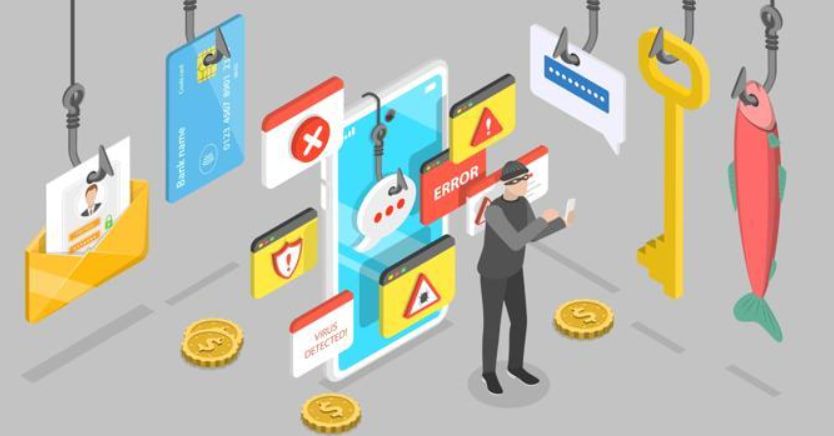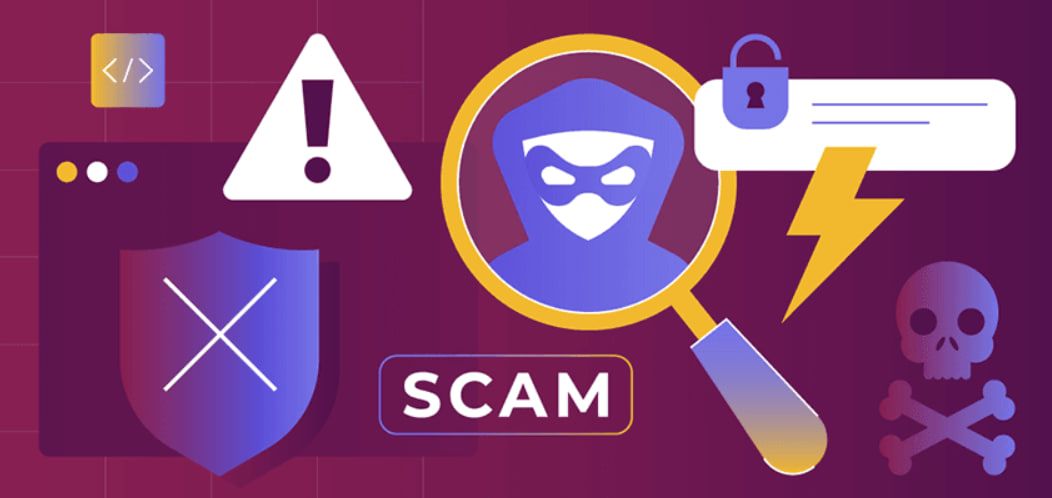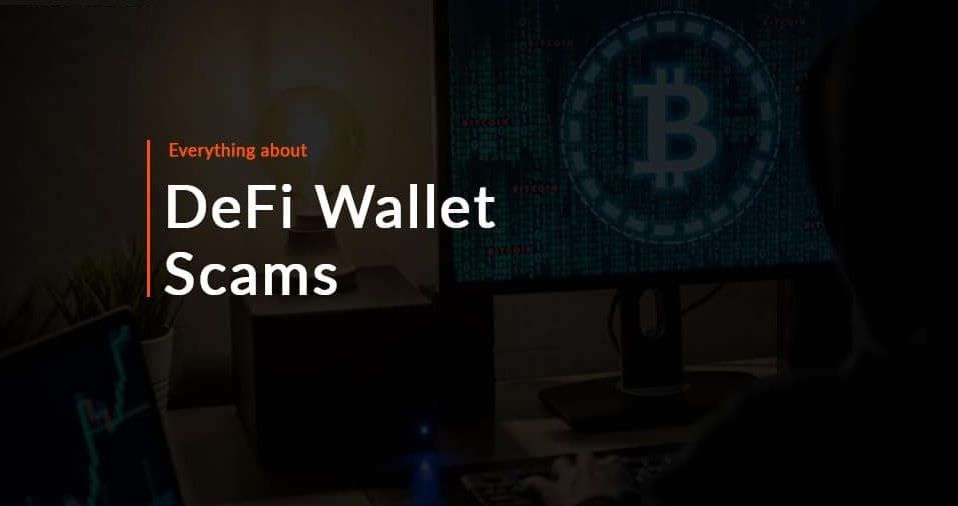The rise of decentralized finance (DeFi) has revolutionized how we manage and interact with digital assets. At the heart of this new era is the DeFi wallet, a tool that allows users to control their own funds without relying on centralized institutions. However, this autonomy also brings certain risks, particularly in the form of DeFi wallet scams.
In this article, join FMCPAY to explore common types of scams targeting DeFi wallets and how to protect yourself from these fraudulent schemes.
1. What is a DeFi Wallet?
A DeFi wallet is a digital wallet designed to store, manage, and interact with decentralized applications (DApps) on the blockchain.
Unlike traditional wallets controlled by banks or exchanges, DeFi wallets are non-custodial, meaning users have full control over their private keys and assets. These wallets can be used to send, receive, and store various cryptocurrencies, as well as engage in staking, lending, and other DeFi activities.

The autonomy provided by DeFi wallets is one of their most attractive features. However, with great power comes great responsibility. Because users are the sole owners of their private keys, losing access to these keys means losing access to their funds. This decentralized nature makes DeFi wallets a prime target for scammers, who exploit the complexities of DeFi to deceive unsuspecting users.
Related topics:
- What is DeFi Wallet & Why Do You Need One in Blockchain?
- 9 Most Common Cryptocurrency Scams & How to Avoid Them
2. Introduction to DeFi Wallet Scams
As decentralized finance continues to grow in popularity, so do the scams designed to target users. Crypto DeFi wallet scams are malicious schemes aimed at stealing crypto assets or personal information from users. These scams exploit vulnerabilities in users’ behavior, smart contracts, or wallet security features to drain funds or gain unauthorized access.
While traditional financial scams are often backed by regulations and protections, the decentralized nature of DeFi means that once funds are stolen, recovering them is often impossible. Understanding these scams and how they operate is crucial for anyone navigating the DeFi ecosystem. Let’s delve into some of the most common types of DeFi wallet scams.
3. Common Types of DeFi Wallet Scams
Here we break down the key tactics used in DeFi wallet scams and what to watch out for. By staying informed, you can better protect yourself from falling prey to these deceptive schemes.
3.1. Phishing Attacks
Phishing attacks are one of the most prevalent DeFi wallet scams. In these schemes, scammers create fraudulent websites or emails that closely mimic those of legitimate wallet providers or DeFi platforms.
Their goal is to trick users into entering sensitive information, such as private keys, seed phrases, or login credentials. Once scammers acquire this information, they can swiftly access and drain the victim’s wallet, often leaving them with irreversible losses.

To safeguard against phishing attacks, always double-check URLs and refrain from clicking on unsolicited links or attachments. Make it a habit to access directly to your DeFi wallet provider’s official website or app. Be especially cautious of messages that create a sense of urgency, urging you to act quickly without verifying their authenticity.
3.2. Fake Wallet Apps and Extensions
Another significant type of DeFi wallet scams involves fraudulent wallet applications and browser extensions. Scammers create counterfeit versions of popular wallet apps, mimicking their user interfaces and features. Once users download these malicious applications, the scammers can steal private keys or seed phrases, leading to the loss of funds.
To protect yourself, only download wallet apps and browser extensions from reputable sources, such as official app stores or direct links from the wallet provider’s website. Look for indicators of legitimacy, such as user reviews, ratings, and the number of downloads.
Scammers often employ tactics like offering “exclusive features” or “limited-time bonuses” to entice users to download their fraudulent apps. If something seems too good to be true, it probably is.
3.3. Social Engineering Schemes
Social engineering scams are another prevalent tactic among DeFi wallet scams. These scams manipulate human behavior to trick users into revealing sensitive information.
Scammers often pose as customer support representatives, influential figures in the crypto space, or even fellow community members to gain a user’s trust. They may reach out via social media, forums, or email, claiming to assist with technical issues or offering exclusive investment opportunities.

To avoid falling for social engineering schemes, never share your private keys or seed phrases with anyone, regardless of how credible they may seem. Legitimate companies will never ask for this type of sensitive information. Be cautious of unsolicited messages, and verify the identities of anyone asking for personal information through official channels.
Always remember that your security is paramount, and no opportunity is worth compromising your wallet’s safety.
3.4. Smart Contract Vulnerabilities
Smart contracts are foundational to the DeFi ecosystem, facilitating automated transactions and interactions on the blockchain. However, poorly written or malicious smart contracts can contain vulnerabilities that scammers can exploit. Users may unknowingly grant permissions to malicious contracts that can access and transfer their assets without their consent. This type of exploit often goes unnoticed until it’s too late.
To mitigate the risks associated with smart contract vulnerabilities, it is essential to perform due diligence before engaging with any smart contract. If you’re technically inclined, reviewing the contract code can provide insights into its safety. Alternatively, consult community resources and user reviews to assess the trustworthiness of the platform. Only grant permissions to well-established and reputable platforms, as these are more likely to have undergone thorough audits and security checks.
By familiarizing yourself with these common types of DeFi wallet scams, you can better navigate the risks associated with decentralized finance and protect your digital assets. Always remain cautious and proactive in safeguarding your investments in the ever-changing landscape of DeFi.
4. How to Recognize DeFi Wallet Scams?
Recognizing DeFi wallet scams can be challenging, especially for those new to the crypto space. However, there are several red flags that can help you identify potential scams before falling victim to them:

Unsolicited Messages and Emails
If you receive unsolicited messages or emails asking for your private keys or login credentials, it’s likely a scam. Legitimate wallet providers will never ask for this information. Always verify the sender’s identity before responding or clicking any links.
Suspicious URLs and Apps
Be cautious of websites or apps that look almost identical to legitimate platforms but have slight differences in their URLs or interfaces. Always double-check the website’s URL and avoid downloading apps from unofficial sources.
Too-Good-to-Be-True Offers
Scammers often lure users with promises of guaranteed returns, exclusive investment opportunities, or “airdrops” that require you to provide your private keys or sign transactions. If an offer seems too good to be true, it probably is. Always be skeptical of such claims and do your research before interacting with any platform.
Unverified Smart Contracts
Before interacting with a new DeFi protocol or smart contract, check if it has been audited by a reputable security firm. Unverified contracts or those lacking a clear security audit could expose your funds to risk.
5. What to Do Next After a DeFi Wallet Scam?
Experiencing DeFi wallet scams can be a devastating event, leaving victims feeling vulnerable and uncertain about their next steps. While it’s important to act quickly, it’s equally crucial to remain calm and take the right actions to mitigate the damage and protect your assets. Here’s a step-by-step guide on what to do if you’ve fallen victim to DeFi wallet scams.

5.1. Assess the Situation
The first step after realizing you’ve been scammed is to assess the situation. Determine what information or assets have been compromised. If you’ve lost access to your wallet or funds, make a note of the transactions that occurred. Gathering this information can be helpful for recovery efforts and reporting the scam.
5.2. Secure Your Remaining Assets
If you still have assets in your compromised wallet or related accounts, it’s essential to secure them immediately. Change passwords and enable two-factor authentication (2FA) on your accounts to add an extra layer of protection. If you suspect that your DeFi wallet may be compromised, transfer any remaining funds to a new, secure wallet. When creating a new wallet, choose a reputable provider and ensure you are downloading from official sources to avoid further DeFi wallet scams.
5.3. Report the Scam
Reporting the DeFi wallet scams is the next thing to do. Begin by notifying the wallet provider about the incident. They may have procedures in place for dealing with such situations and can guide you on the next steps. Additionally, report the scam to relevant platforms or forums where you encountered the scam. Many communities take DeFi wallet scam seriously and may take actions to protect other users.
You should also consider reporting the scam to law enforcement agencies. While recovering lost funds might be challenging, a police report can help raise awareness about ongoing scams in your area and potentially lead to investigations.
5.4. Learn from the Experience
Understanding how the scam occurred is vital to preventing future incidents. Analyze the circumstances that led to the scam and identify any red flags you may have missed. This could include suspicious emails, links, or poorly designed applications. Education is a powerful tool against DeFi wallet scams. Familiarize yourself with common tactics used by scammers, such as phishing attacks and fake applications.
5.5. Join Community Support
Consider joining communities focused on educating users about crypto safety and DeFi wallet scams. Engaging with others who have experienced similar scams can provide emotional support and practical advice. These communities often share information about current scams, helping members stay informed and vigilant.
Additionally, many forums have sections dedicated to reporting scams and sharing experiences, which can help you and others avoid falling victim to the same traps.
Conclusion
The decentralized nature of DeFi offers significant benefits, but it also opens the door to risks like DeFi wallet scams. By staying informed about the common types of scams and learning how to recognize suspicious behavior, you can protect your crypto assets and navigate the DeFi space with greater confidence.
To further safeguard your investments and stay updated on the latest crypto security trends, stay tuned with the Crypto Insights section from FMCPay, where you’ll find in-depth articles and tips on how to protect your assets in the rapidly evolving world of decentralized finance.

